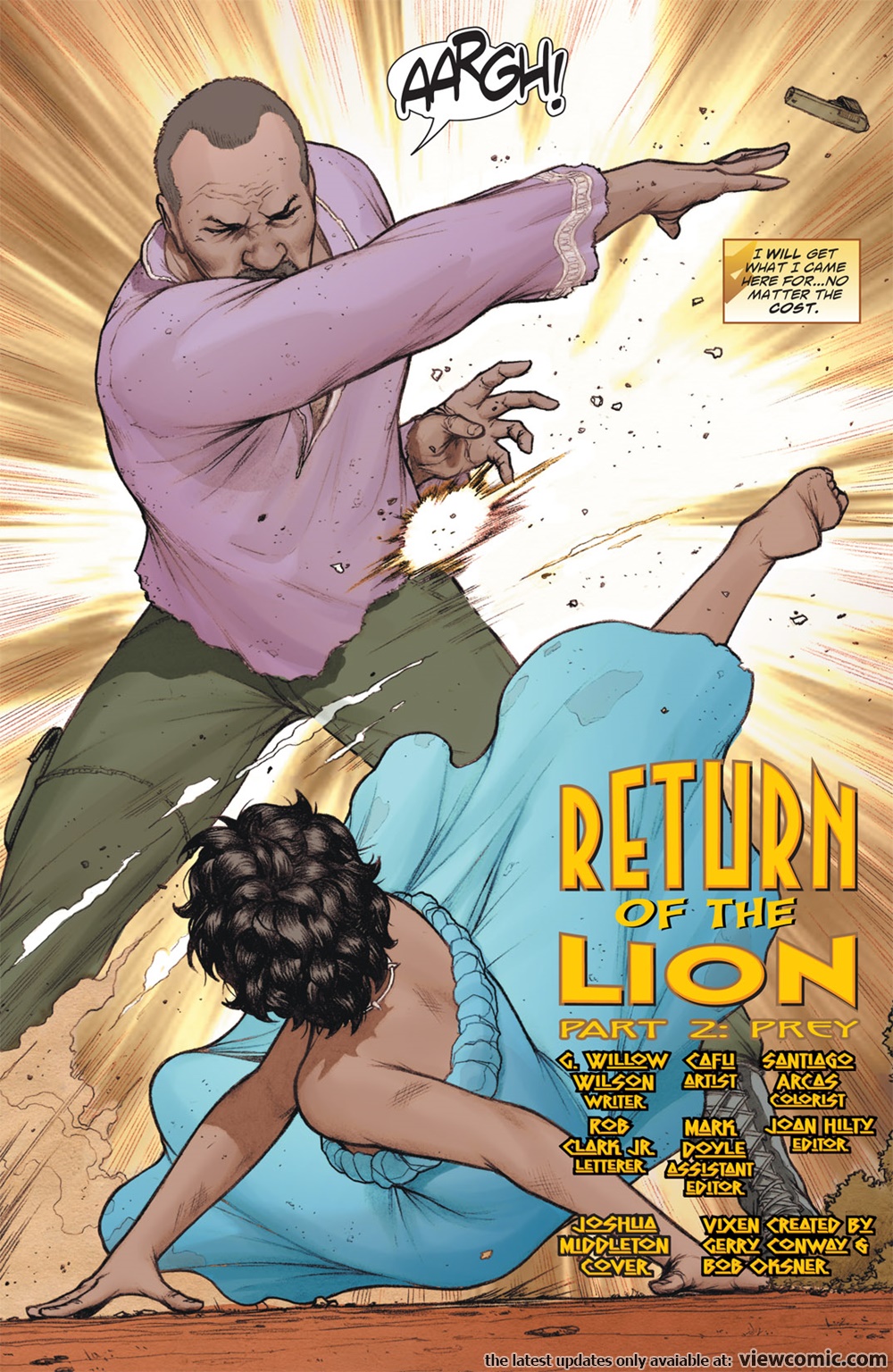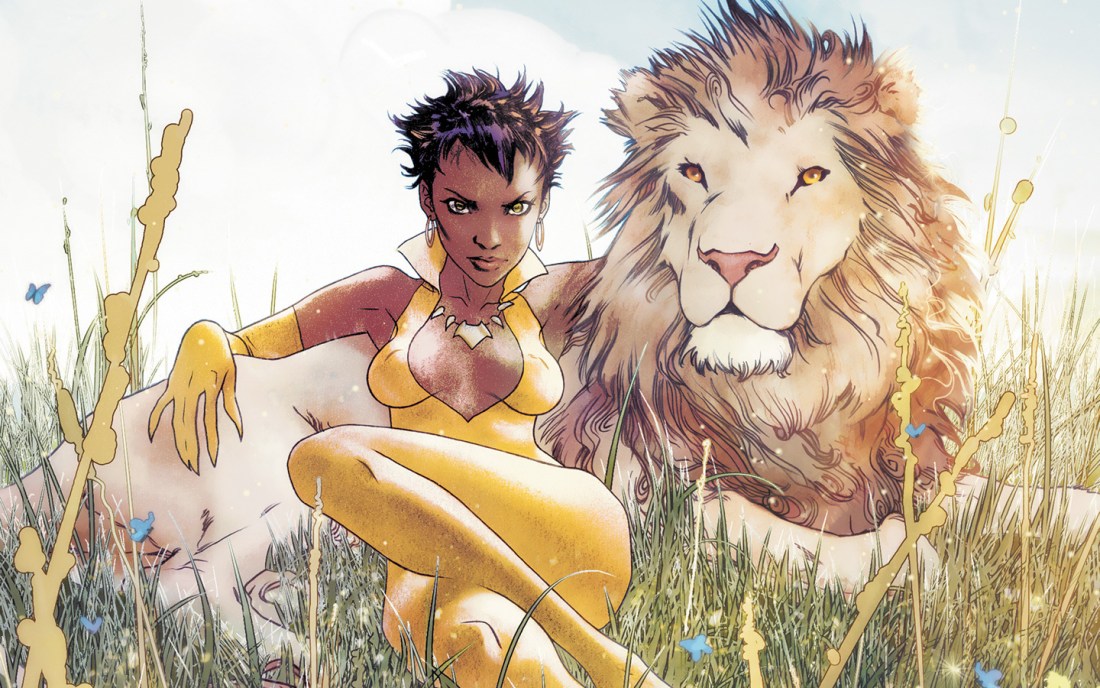Writer: G. Willow Wilson / Artist: CAFU / DC Comics
Here I am, browsing DC Universe unsure of what this week’s editorial will be. The website has a habit of showcasing characters who are in the latest DC superhero shows. I’ve long fallen off the Arrow series so imagine my surprise to see a spotlight on Vixen. Now, Vixen is one of the characters that I read very little of. Most of what I’ve seen has been some of the excellent episodes of Justice League: Unlimited so my interest was piqued. The first suggestion they gave me was this mini-series by Gwendolyn Wilson. When I looked up the writer, I was blown away that she is no other than G. Willow Wilson. The glorious writer was a co-creator and head storyteller of one of Marvel’s most successful new characters in the past decade, Kamala Khan a.k.a Ms. Marvel. By this point, it was a done deal that I was going to read this.

First, my spoiler-free endorsement. Return of the Lion is a perfect five issue hero arc. Its magic comes from Wilson’s ability to weave in themes of cultural identity, imposter syndrome, and the intervention of developing countries. Mari Jiwe McCabe is torn between her fictional homeland ‘Zambesi’ and her life as a model and superhero based in the United States. She’s plagued with feelings of inferiority, surrounded by the iconic likes of Superman, Batman, and Black Canary. The comic is correctly critical of white, western intervention by countries and companies who will surely exploit an African countries resources and people. I was incredibly impressed by this portrayal of a black superhero.
Beware of Spoilers, ye who Enter Here
This book gets off to a good start. Vixen, Superman, Black Canary and Batman are taking down an Intergang cell when they uncover that a poaching accident 15 years ago was a coordinated assassination of Vixen’s mother. Superman hides this information to tell her in private. This scene felt reflexively white savior-y, but I got the sense that he tells her as soon as possible. She tells Superman that she’s going home to handle it, with or without his permission. She finds her village oppressed by a warlord, Kwesi. She defeats two of his men, jaguar-style before a super powered Kwesi severely wounds Vixen and leaves her for dead.
Mari meets Sia. He serves as a mediator; attempting to soften Kwesi’s treatment of the village but still loyal to him. He helps Vixen. Well, help is a strong word. He directs her to a well six miles away where she might survive if she makes the trek. In traditional epic-style, our heroine finds the spirit of her dead mother for a pep talk from beyond the grave. She’s encouraged to remember the land that gave her her powers. After giving some jackals the hyena-cobra, one-two business she comes across a lion. Seemingly overpowered, the lion brings her to a wise man named Brother Tabu (who shares a striking resemblance to Nelson Mandela). Brother Tabu gives Mari her second lesson, telling her to embrace all parts of her. She even has a Space Jam moment and takes flight as a falcon until she realizes Tabu had taken the “Jordan’s Secret Stuff”-totem. Vixen’s epiphany that the power to tap into the Red is within her is put to the test. A rogue lion is attacking villages left and right and needs to be put down. She tracks and engages the lion with an inspirational thought, “I AM the lion.”
Yes, Brother Tabu!
 Vixen’s struggle and Brother Tabu’s advice resonated with me hard. It is a familiar conflict to feel like embracing one part of your identity undermines another. For me it’s occurred in the shape of nationality (Black vs American) and between my faith (or lack thereof) and my culture. Our hero sums it up well, “When I’m with them, I’m Vixen. This is Mari’s fight.” Brother Tabu later gives great advice. “You are more than your mind, child. You are also your soul. And the soul knows no master . . . .“ You would have to live in the most homogenous bubble not to connect with this sentiment. It is a simple, yet profound idea that all the quirks and cultures and nationalities make up a unique soul. Mari’s comeback apotheosis is marked by the tracking and attacking of the rogue lion. It marks an ongoing beauty of the series’ art where Vixen fights with ferocious intensity in her face and body language. The color palate has a marked softness that works particularly well with the earthy tones of the savanna.
Vixen’s struggle and Brother Tabu’s advice resonated with me hard. It is a familiar conflict to feel like embracing one part of your identity undermines another. For me it’s occurred in the shape of nationality (Black vs American) and between my faith (or lack thereof) and my culture. Our hero sums it up well, “When I’m with them, I’m Vixen. This is Mari’s fight.” Brother Tabu later gives great advice. “You are more than your mind, child. You are also your soul. And the soul knows no master . . . .“ You would have to live in the most homogenous bubble not to connect with this sentiment. It is a simple, yet profound idea that all the quirks and cultures and nationalities make up a unique soul. Mari’s comeback apotheosis is marked by the tracking and attacking of the rogue lion. It marks an ongoing beauty of the series’ art where Vixen fights with ferocious intensity in her face and body language. The color palate has a marked softness that works particularly well with the earthy tones of the savanna.
Not Today, Colonizer
Vixen’s newfound peace and strength is put to the test as Intergang is revealed to be pulling Kwesi’s strings and giving him the strength to best a metahuman like Vixen. Using a modified poison of Zambesi, the aim is to control the Justice League. Luckily, when Sia learns the truth of his boss’ masters, he helps Vixen to foil the plan. In a final conflict, Vixen has her rematch with Kwesi. When his power is revealed, he challenges Vixen’s power as not being her own either. She proceeds to end the fight with a totem-free, bear body slam. In a profound ending, when Batman insists on taking Kwesi with them Vixen refuses. “Kwesi is accountable to these people, not to us.”
I appreciated this directly relevant conflict of foreign forces enforcing their own justice on a people under the guise of ‘liberation.’ Sia articulates it well; “What would you have instead? Foreign troops on our ground, our resources snatched away from us? Another African tragedy?” I’m impressed and grateful for G. Willow Wilson for incorporating the history of African exploitation by Europe and America.
This book has it all. It’s succinct, profound, relatable and exciting. It makes me want to reach out and find more Vixen stories and more stories by the Bast damned American treasure, G. Willow Wilson. Stay tuned for more of that kind of content soon. Stay safe, Nerds.
Want to get Black Nerd Problems updates sent directly to you? Sign up here!
Follow us on Twitter, Facebook and Instagram!




Show Comments